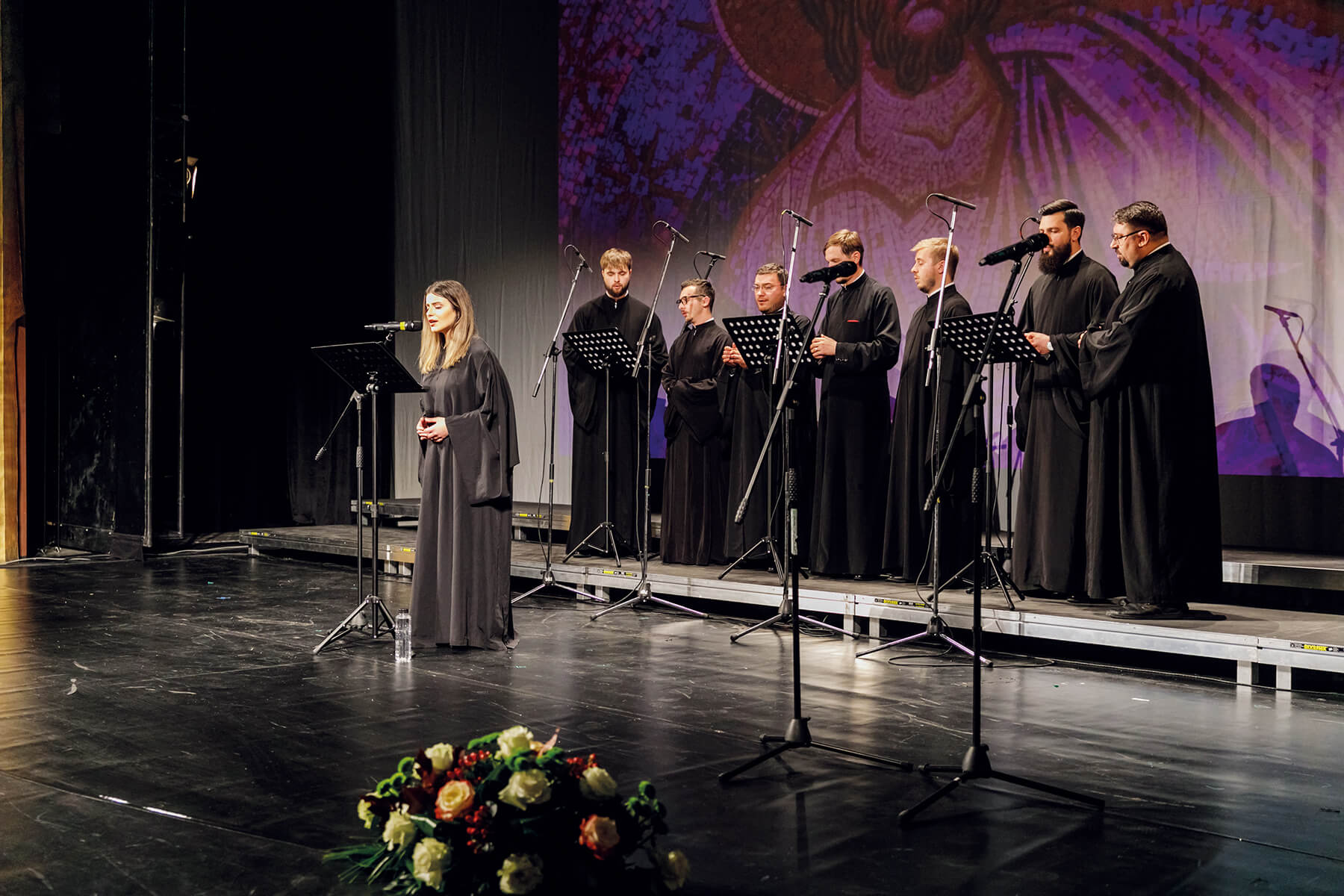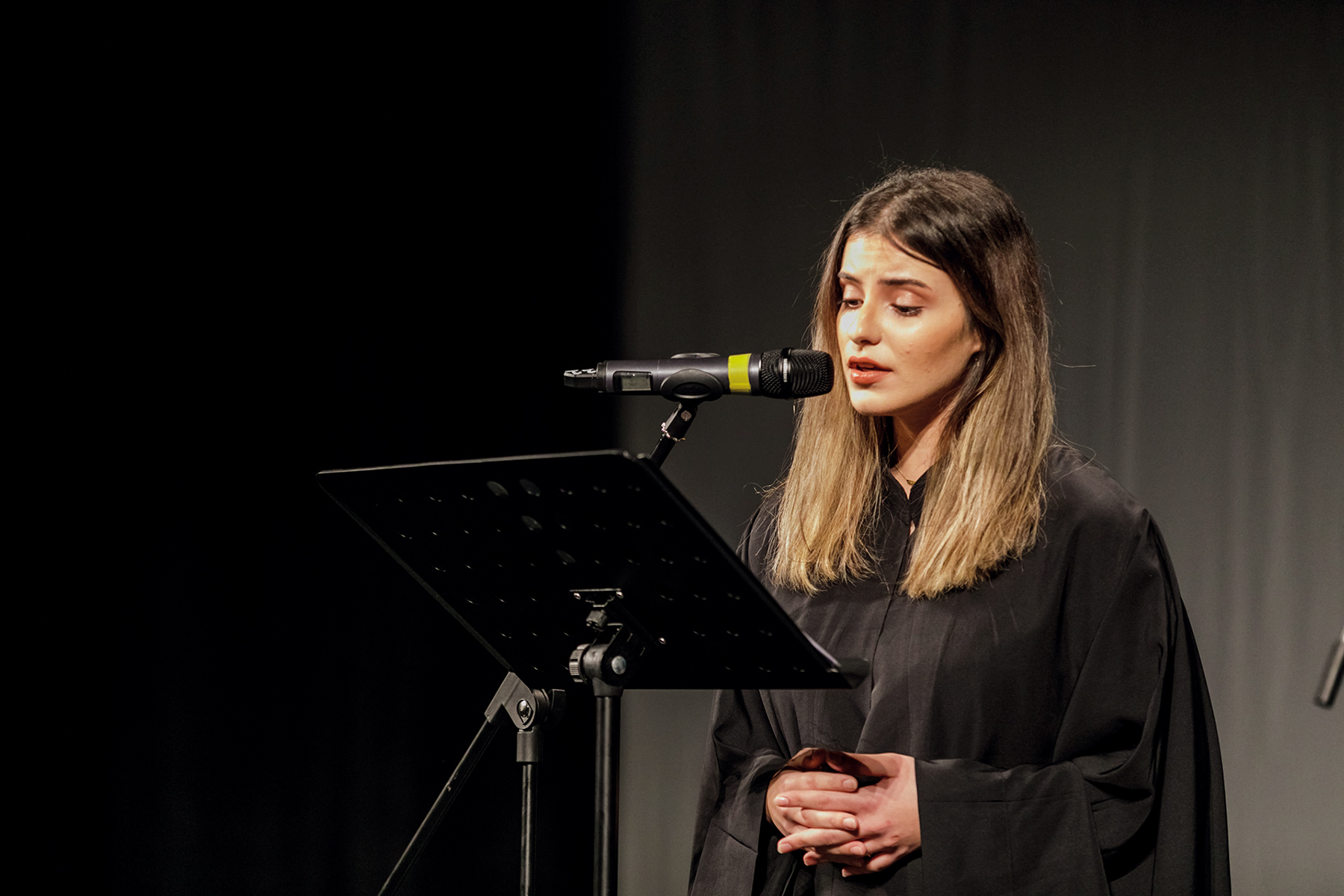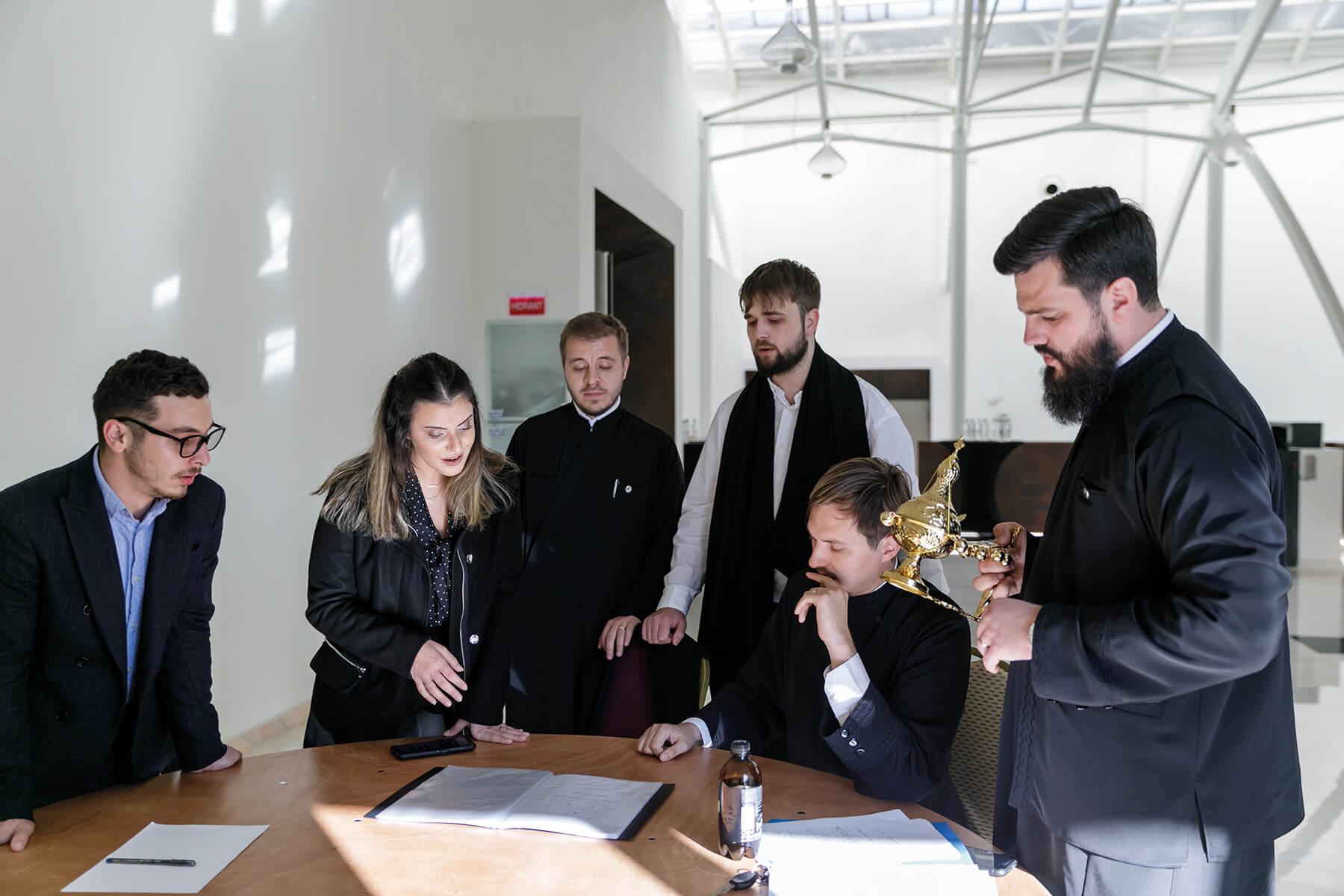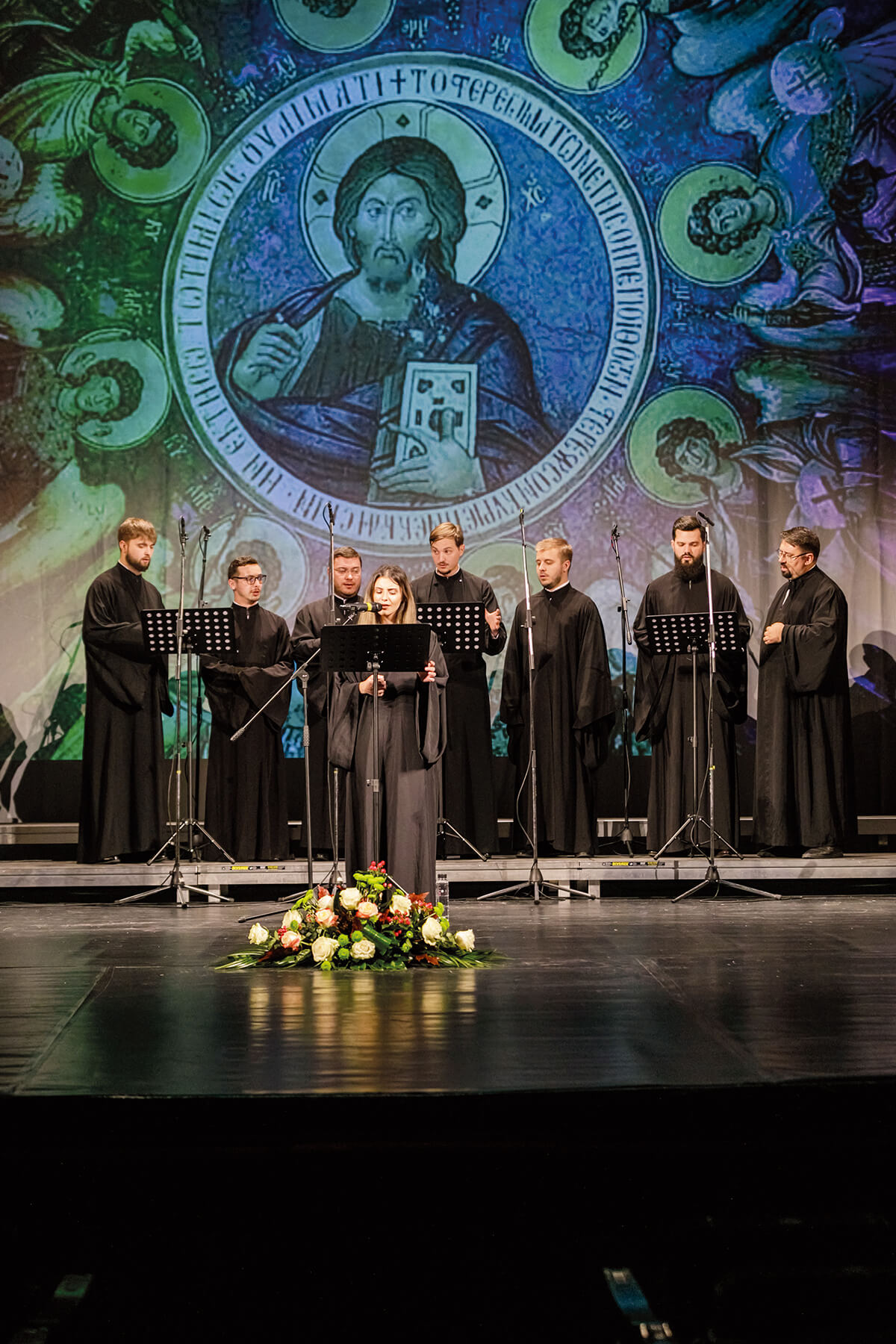Articolul poate fi citit și în limba engleză. / The article is also available in English.
„M-am născut într-o familie de muzicieni și am trăit în această atmosferă a muzicii. Împreună cu familia mergeam de mică la biserică, unde tatăl și fratele meu cântau în strană. Ascultam muzica psaltică și îmi plăcea mult. Apoi, am început să cânt această muzică. Părinții m-au încurajat să învăț muzica psaltică și cea orientală. Acum, la 22 de ani, pot spune că faptul de a cânta este un dar primit de când eram copil și pe care am încercat să-l formez”. Așa se caracterizează succint Ribale Wehbe, din Liban, căreia îi suntem recunoscători pentru că a binevoit să ne răspundă la câteva întrebări.
Care sunt valorile care te-au călăuzit în viață și cum le-ai dobândit? Ce te atrage cel mai mult spre Biserică?
Din copilărie am mers la biserică și acolo am simțit că pot să fiu aproape de Dumnezeu și să ascult cuvintele Lui. În Biserică omul învață multe valori folositoare pentru viața lui, pe care începe să le aplice. Începe să învețe să lucreze cu smerenie, dragoste și bunătate. Bineînțeles, educația de acasă are un rol esențial! Însă, pentru mine, faptul că îmi place să cânt m-a atras foarte mult spre biserică. Deci, două lucruri în mod esențial: muzica psaltică și credința care era trăită acasă, care mi-au aprins iubirea de a merge la biserică.

Care sunt valorile transmise de Biserică societății?
Iubirea, comuniunea, smerenia și împărtășirea. În Biserică există o atmosferă de comuniune prin rugăciune și acest lucru afectează pozitiv și viața socială, în măsura în care reușim să transmitem această atmosferă a rugăciunii sau a comuniunii. Astfel, omul poate să simtă nevoia aproapelui și să trăiască în iubire cu el. Bineînțeles, și cuvântul Evangheliei rostit de preot și explicația ei au un rol profund. Dacă am fi urmat cuvintele Evangheliei sau viața bisericească, nu s-ar fi ajuns la războaie. Biserica ne învață, în primul rând, să ne înfrânăm, să scăpăm de lăcomie și că nu putem lua absolut nimic cu noi în viața veșnică din cele pământești.
Cât de importantă este viața liturgică pentru formarea unui tânăr?
Este foarte important ca omul, de când este copil, să intre în viața Bisericii, pentru că este mult mai ușor să primească în sufletul lui aceste valori când e mic. Pentru adolescenți este mai greu. Părinții trebuie să aibă o anumită „strategie”, care să fie cât mai blândă, pentru a fi acceptată mai ușor de tineri. Și atunci, tânărul poate trăi cu sentimente mult mai plăcute, cu iubire și cu bunătate, realizând adevărata comunicare și comuniune cu ceilalți.

Cum ai început să cânți în corul bisericii? Cum ai ajuns să cânți muzică psaltică? La noi, în România, este neobișnuit ca femeile să cânte muzică psaltică, o muzică interpretată în principal de bărbați.
Mergeam la biserică de când eram foarte mică, unde stăteam în strană și cântam împreună cu tatăl și cu fratele meu. Eram atrasă de muzica psaltică de foarte mică. M-a ajutat mult că Dumnezeu mi-a dăruit acest talent de a cânta. Legat de acest lucru, vreau să povestesc o experiență pe care am avut-o pe când aveam opt ani, cu corul de la Muntele Libanului, care se numește Sem, și în care am cântat. La un concert ținut de corul Sem, care se numea „Din generație în generație”, s-a permis să participe și copiilor mici. Au cântat un solist mai în vârstă, unul tânăr și un copil, iar copilul eram eu. Când am văzut că oamenii s-au bucurat de felul cum am cântat și m-au încurajat, am simțit că vreau să merg mai departe pe această cale. A fost o provocare pentru mine, mai ales pentru faptul că la noi nu sunt multe femei sau fete care cântă muzică psaltică. În schimb, în lume sunt multe fete sau femei care cântă, deși numărul lor nu este foarte mare în comparație cu numărul băieților. Dar am fost ajutată să depășesc această provocare, pentru că Dumnezeu mi-a dat acest talent sau dar.
Presupun că muzica psaltică este doar unul dintre lucrurile pe care le faci în viață. Care sunt activitățile în care te regăsești, în afară de muzica psaltică?
Într-adevăr, sunt și alte activități sau domenii, dar toate au legătură cu muzica. De exemplu, sunt specialistă în muzicologie. Muzica mă inspiră, predau muzică orientală și îmi plac foarte mult cântările orientale și tradiționale, dar mai cu seamă cele care au un anumit mesaj sau care transmit anumite sentimente. Chiar și în timpul pandemiei, nu am întrerupt predarea. Chiar dacă s-au suspendat toate adunările și întâlnirile publice, am făcut numeroase cursuri online și am reușit să am mulți studenți din întreaga lume.
Dar predau anumite cursuri și copiilor mici, cu vârste între 3 și 5 ani, ca să-i fac să descopere ce fel de muzică li se potrivește sau care le place mai mult. Se numește educație muzicală sau, probabil, conștientizare muzicală. În special în Liban, sunt foarte mulți oameni care își trimit copiii la această școală, ca să știe în viitor ce fel de muzică ar fi mai potrivită pentru ei. Predau muzica prin joc. Este un alt fel de muzică.
Există momente când simți că viața în Biserică este obositoare sau dificilă?
Cred că momentele grele prin care trece un om în viață nu sunt cele petrecute în Biserică, ci în afara Bisericii. Biserica este scăparea noastră. În Biserică Îl chemăm pe Dumnezeu și simțim că suntem deja în altă lume. De aceea este foarte important ca tinerii să meargă de foarte mici la biserică, pentru că acest lucru îi ajută de-a lungul întregii vieți. Cei care merg la biserică primesc educația de a avea duhul bunătății, și nu al răului. Prin această misiune, Biserica elimină sau reduce multe probleme din lume, pentru că tinerii care nu merg la biserică ajung în multe rele. Pentru mine, momentele grele sunt confruntarea cu cei care nu merg la biserică, atât întâlnirea cu ei, cât și disputele care apar. Este foarte greu să vorbești cu oameni care nu înțeleg ce înseamnă viața spirituală. Este ca un blocaj.
Ce ar trebui să le ofere Biserica tinerilor ca să vină și să se simtă parte a Bisericii?
Lumea noastră este plină de îndoieli. Și de aceea, tinerii, în primul rând, caută în Biserică tihna, odihna sufletească, în această lume tulburată de multe întrebări și îndoieli. Pe mine, ceea ce mă atrăgea mai mult erau activitățile desfășurate în Biserică. Eu am învățat psaltica prin tabere de psaltică organizate de Biserică. Mergeam la mănăstiri și învățam psaltică, dar făceam și anumite activități și jocuri pentru copii. Tinerii vor să petreacă un timp frumos în Biserică și de aceea, de multe ori, învățătura Bisericii trebuie transmisă pe căi indirecte, nu prin predici, ci prin activități adaptate la nivelul lor de pregătire, la vârsta lor, după cum le place. Este foarte important să fie transmis cuvântul Evangheliei în mod accesibil, practic, să poată fi înțeles de oricine.
Cum ai găsit România și oamenii de aici?
România este a doua mea casă. Țin foarte mult la români și simt că ei sunt ca noi. Și îmi place foarte mult România, pentru că primul meu concert internațional a fost în România, la Brașov. Românii sunt foarte generoși, și în privința asta ne asemănăm.
Din punctul tău de vedere, cum este trăită credința în Liban în comparație cu România?
Am vizitat România de opt ori și în curând va fi a noua oară. Credința este vie și în România, și în Liban. Multă lume merge la biserică și participă la slujbe. Nu prea am găsit diferențe semnificative în această privință. Probabil diferența este că noi, ortodocșii, în Liban suntem o minoritate. Și deși suntem o minoritate, acest lucru nu afectează viața noastră bisericească. Mergem în mod firesc la biserică, facem slujbe, nu avem nicio problemă sau tensiune politică în această privință. În România, cultura este foarte înrădăcinată în tradiție. În schimb, în Liban lucrurile nu stau așa. De exemplu, am observat, când am ascultat colindele în România, că de multe ori au această atmosferă bisericească, caldă, uneori și psaltică. În schimb, noi nu prea avem această atmosferă pe care o transmit colindele în România. La noi, colindele sunt departe de tradiția bizantină sau psaltică, pentru că sunt influențate de mai multe secte și confesiuni creștine.

Care ar fi invitația pe care ai vrea să o faci unui tânăr?
Să-L iubească necondiționat pe Dumnezeu, să aibă încredere în mesajul pe care Biserica vrea să-l transmită și să primească o educație bazată pe valorile bisericești. Doar așa reușim să scăpăm de toate problemele și războaiele prin care trecem. Până la urmă, nu ne însoțește în veșnicie nimic din cele pământești. Iar pe tinerii care au talent și vor să-L slujească pe Dumnezeu prin acesta îi încurajez și le spun că nu este nimic mai frumos în viață decât să-L slujești pe Dumnezeu prin talentul tău, prin talantul dăruit ție de Dumnezeu.
There is nothing more beautiful in life than to serve God through the gift He has entrusted you with
„I was born in a family of musicians and have grown on this atmosphere surrounded by music. Together with my family, since I was little we would go together at the church where my father and brother sang in the choir. I was listening to psaltic music and I enjoyed it a lot. Then, I have started to sing this type of music myself. My parents have encouraged me to learn psaltic and oriental music. Today, at age of 22, I can openly admit that singing is a gift that I have received since I was a child and which I have tried my best to preserve and develop”. This is how briefly she characterizes herself Ribale Wehbe from Lebanon, to whom we are deeply thankful to having accepted to answer some of our questions.
What are the values that have guided you in life and how have you acquired them? What does attract you the most to Church?
Since childhood I went to church and felt that in there I can get closer to God and get familiar with His teachings. At Church one acquires a lot of useful values for his life, which he then starts to put in practice. He starts to learn how to work with humbleness, love and humanity. It goes without saying, education at home plays an essential role too! Nevertheless, for me, the fact that I like to sing has heavily attracted me to Church. So, two things essentially: psaltic music and the faith lived at home have lighted up my love for attending church.
What are the values that Church conveys to society?
Love, compassion, humility and communion. In Church there is this atmosphere of communion through prayer which positively impacts our social lives, if we manage to further transmit it. Through this, one can easily feel the needs of his neighbor and together live in peace. Of course, the word of the Holy Scriptures preached by the priest alongside its explanation play a profound role too. If we had followed the word of the Holy Scriptures and lived by it, we wouldn’t have ended up fighting wars. Church teaches us, first and foremost, to refrain ourselves from greed and acknowledge we cannot take absolutely anything from our earthly possessions with us in the afterlife.
How important the liturgical life in the development of a young man do you think it is?
It is important for one, ever since he is a child, to get in contact with Church’s life, because it gets way easier to grow these values inside his soul when he is a little. It turns out to be a more difficult task to achieve for teenagers, where the role of parents come into play. Parents need to have a certain „strategy”, as kindest as possible in order to be well received by youngsters. Then, the youngster can experience higher feelings of love and humanity, achieving a true communication and communion with the others.
How did you start singing in the church choir? How did you get into psaltic music? In Romania it is a bit bizarre for women to sing psaltic music, a music performed mainly by men.
I was going at church ever since I was very little and I used to sit in the stall and sang together with my fater and brother. I was attracted to psaltic music since very early. It helped a lot that God has given me this talent of singing. On this, I wish to recall an experience I lived when I was eight years old, with the Mount Lebanon choir which was called Sem and in which I sang. It is about a concert held by the Sem choir named „From generation to generation”, open for participation also to small children. There was an older soloist, a young one and a little one, and the little one was me. When I saw how much people enjoyed my singing and encouraged me, I felt I wanted to go further down this path. It has been a challenge for me, especially since we don’t have many women or girls that sing psaltic music. On the contrary, out there in the world there are plenty of girls or women who sing, although their number is not as high as the one of men. But I was helped to overcome this challenge because this is a gift of God.
I suppose singing psaltic music is just one of the other things you do in life. What are other activities in which you find yourself in, apart from psaltic music?
Indeed, there are other activities or areas of interest, but they all link to music. For example, I am a specialist in musicology. Music inspires me, so I teach oriental music and I enjoy quite a lot oriental and traditional songs, especially those that bear a certain message or instill certain feelings. Even during the time of pandemia, I have not interrupted this teaching activity. Even if all gatherings and public reunions were suspended for a while, I held many online courses and managed to have plenty of students from all around the world.
But I also teach to small children, aged between 3 and 5 years old, certain classes, to make them discover what type of music suits them best or enjoy the highest. It is called musical education or, better even, musical awareness. In Lebanon in particular, there are many people who send their children at this school, to get to know in the future what type of music suits them best. I teach music though play. It is a different type of music.
Are there any moments when you feel that life in Church gets tiresome or difficult?
I believe that some of the difficult moments a person goes through in life are not the ones spent in the Church, but outside the Church. The Church is our escape. In Church we call God and feel that we already belong to a different world. That is why it is very important for youngsters to attend church from early ages, because this will help them a lot throughout their entire life. The ones who go to church receive an education of possessing the spirit of kindness, and not of evilness. Through this mission, the Church eliminates or reduces a lot of problems in the world, because youngsters who do not attend church end up in many evils. To me, the difficult moments lay in the confrontation with people who do not go to church, both in meeting them and in arguing with them. It is very difficult to talk to people who do not understand spiritual life. It feels like a blockage.
What should the Church offer to young people so that they can join and feel part of the Church?
Our world is full of doubts. It is why, young people seek in Church foremost a peace and rest of their soul, in a world troubled by many questions and doubts. For me, what attracted me most were the activities we would run in the Church. I learned psaltic music in dedicated psaltic camps organized by the Church. We were going to monasteries and learned psaltic, but we would also engage in other activities and children games. Young people would like to spend a nice time in the Church and that is why, most often, the teachings of the Church must be transferred indirectly, through activities, and not necessarily through preaching, adapted to their level of training, to their age and by their liking. It is of utmost importance to transmit the word of the Holy Scripture in an accessible, practical and widely understandable way.
From your point of view, how is faith lived in Lebanon as compared to Romania?
I have visited Romania eight times and soon it will be the ninth. Faith is alive in both Romania and Lebanon. A lot of people go to church and attend the service. I did not find any significant differences in this respect. Perhaps the difference is that we, Christians Orthodox in Lebanon are a minority. And although we are a minority, this does not affect our church life. We normally go to church, attend its service and have no problem or political tension in this regard. In Romania, the culture is very deeply rooted in tradition. In Lebanon, however, this is not the case. For instance, I noticed when listening to carols in Romania, most often they instill this warm church atmosphere, sometimes even psaltic. On the other hand, we don't really have this atmosphere that carols convey in Romania. In our country, carols are distant from the Byzantine or choral tradition, because they are influenced by several Christian sects and denominations.
How did you discover Romania and its people?
Romania is my second home. I care a lot about the Romanian people and feel we are alike. I also like the country quite a lot because my first international concert was held in Romania, at Brașov. Romanians are very generous and we are very similar in this regard.
What would you say to a youngster?
To love God unconditionally, to have trust in the message that the Church wishes to convey and to receive an education focused on church values. This is the only way we can succeed to remove all problems and wars that we are going through. At the end of the day, nothing earthly accompanies us into eternity. And for young people who have talent and want to serve God through it, I encourage them and tell them that there is nothing more beautiful in life than to serve God through your talent, through the gift God has entrusted you with.



